ACC213 Assignment 2: Analysis of Ethical and Legal Media Issues
VerifiedAdded on 2023/03/30
|6
|1949
|92
Report
AI Summary
This assignment examines a case scenario involving actor Bubbles, Woman's Digest magazine, and Chanel X TV, focusing on ethical, professional, and legal issues within the media. It explores breaches of privacy under the Privacy Act 1988 and Australian Privacy Principles (APP), as well as violations of the Australian Press Council (APC) principles, particularly regarding privacy and deceptive information gathering. The report analyzes the magazine's actions, including the use of an old school friend, and the television station's broadcast of the interview, highlighting infringements of the Commercial Television Industry Code of Practice. It further discusses complaint mechanisms through the APC and the Australian Communications and Media Authority (ACMA), outlining potential remedies for privacy violations, such as retractions, apologies, and legal actions, providing a comprehensive overview of media law and ethics.
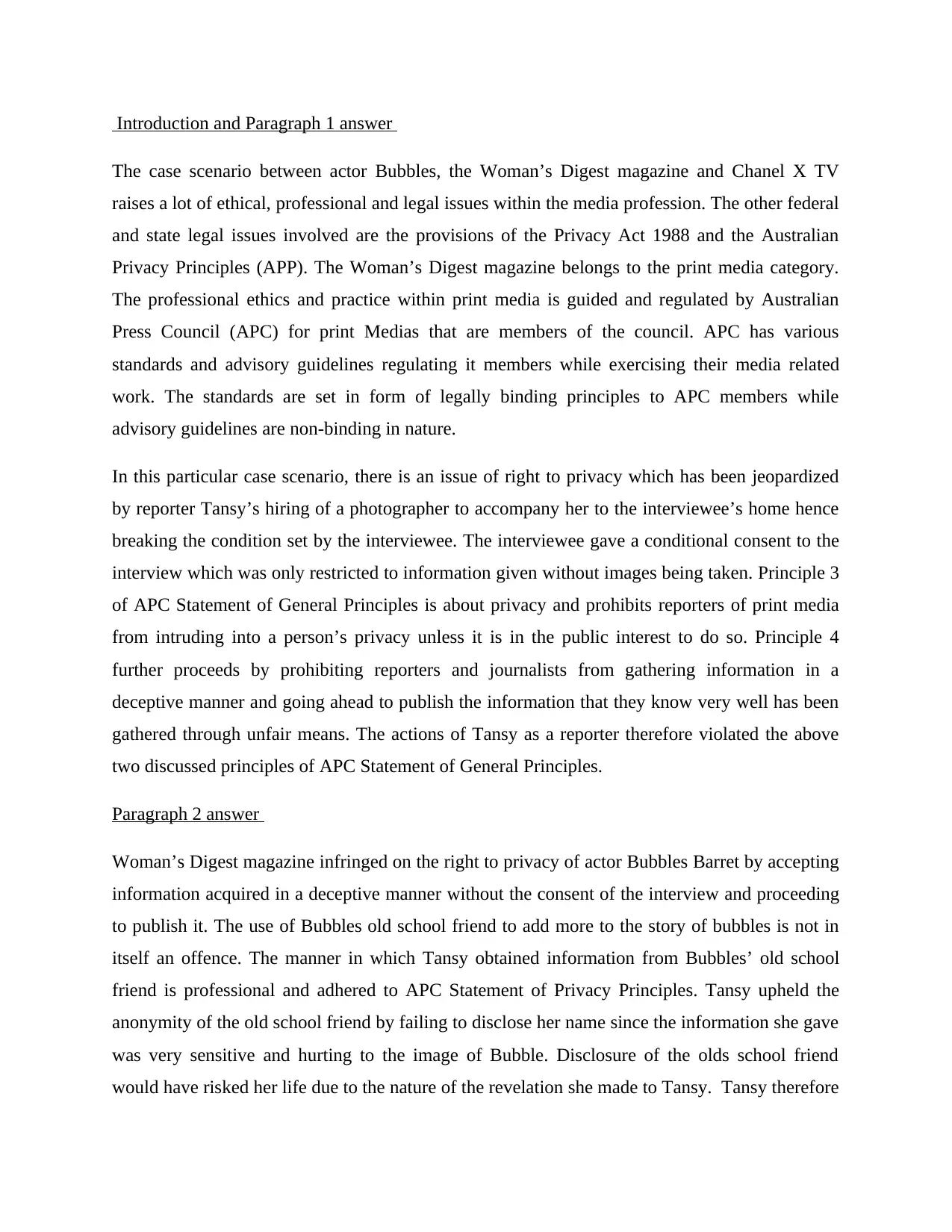
Introduction and Paragraph 1 answer
The case scenario between actor Bubbles, the Woman’s Digest magazine and Chanel X TV
raises a lot of ethical, professional and legal issues within the media profession. The other federal
and state legal issues involved are the provisions of the Privacy Act 1988 and the Australian
Privacy Principles (APP). The Woman’s Digest magazine belongs to the print media category.
The professional ethics and practice within print media is guided and regulated by Australian
Press Council (APC) for print Medias that are members of the council. APC has various
standards and advisory guidelines regulating it members while exercising their media related
work. The standards are set in form of legally binding principles to APC members while
advisory guidelines are non-binding in nature.
In this particular case scenario, there is an issue of right to privacy which has been jeopardized
by reporter Tansy’s hiring of a photographer to accompany her to the interviewee’s home hence
breaking the condition set by the interviewee. The interviewee gave a conditional consent to the
interview which was only restricted to information given without images being taken. Principle 3
of APC Statement of General Principles is about privacy and prohibits reporters of print media
from intruding into a person’s privacy unless it is in the public interest to do so. Principle 4
further proceeds by prohibiting reporters and journalists from gathering information in a
deceptive manner and going ahead to publish the information that they know very well has been
gathered through unfair means. The actions of Tansy as a reporter therefore violated the above
two discussed principles of APC Statement of General Principles.
Paragraph 2 answer
Woman’s Digest magazine infringed on the right to privacy of actor Bubbles Barret by accepting
information acquired in a deceptive manner without the consent of the interview and proceeding
to publish it. The use of Bubbles old school friend to add more to the story of bubbles is not in
itself an offence. The manner in which Tansy obtained information from Bubbles’ old school
friend is professional and adhered to APC Statement of Privacy Principles. Tansy upheld the
anonymity of the old school friend by failing to disclose her name since the information she gave
was very sensitive and hurting to the image of Bubble. Disclosure of the olds school friend
would have risked her life due to the nature of the revelation she made to Tansy. Tansy therefore
The case scenario between actor Bubbles, the Woman’s Digest magazine and Chanel X TV
raises a lot of ethical, professional and legal issues within the media profession. The other federal
and state legal issues involved are the provisions of the Privacy Act 1988 and the Australian
Privacy Principles (APP). The Woman’s Digest magazine belongs to the print media category.
The professional ethics and practice within print media is guided and regulated by Australian
Press Council (APC) for print Medias that are members of the council. APC has various
standards and advisory guidelines regulating it members while exercising their media related
work. The standards are set in form of legally binding principles to APC members while
advisory guidelines are non-binding in nature.
In this particular case scenario, there is an issue of right to privacy which has been jeopardized
by reporter Tansy’s hiring of a photographer to accompany her to the interviewee’s home hence
breaking the condition set by the interviewee. The interviewee gave a conditional consent to the
interview which was only restricted to information given without images being taken. Principle 3
of APC Statement of General Principles is about privacy and prohibits reporters of print media
from intruding into a person’s privacy unless it is in the public interest to do so. Principle 4
further proceeds by prohibiting reporters and journalists from gathering information in a
deceptive manner and going ahead to publish the information that they know very well has been
gathered through unfair means. The actions of Tansy as a reporter therefore violated the above
two discussed principles of APC Statement of General Principles.
Paragraph 2 answer
Woman’s Digest magazine infringed on the right to privacy of actor Bubbles Barret by accepting
information acquired in a deceptive manner without the consent of the interview and proceeding
to publish it. The use of Bubbles old school friend to add more to the story of bubbles is not in
itself an offence. The manner in which Tansy obtained information from Bubbles’ old school
friend is professional and adhered to APC Statement of Privacy Principles. Tansy upheld the
anonymity of the old school friend by failing to disclose her name since the information she gave
was very sensitive and hurting to the image of Bubble. Disclosure of the olds school friend
would have risked her life due to the nature of the revelation she made to Tansy. Tansy therefore
Paraphrase This Document
Need a fresh take? Get an instant paraphrase of this document with our AI Paraphraser
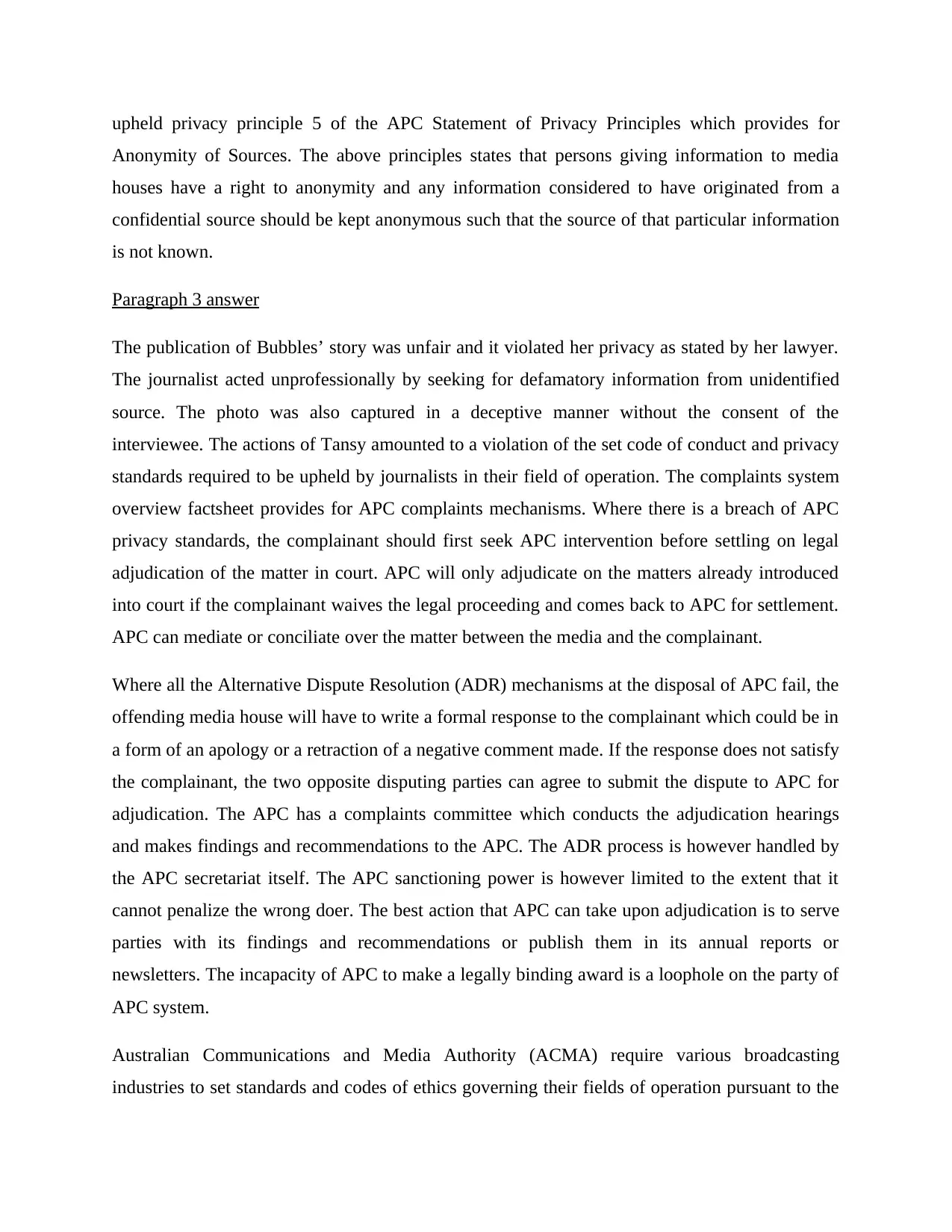
upheld privacy principle 5 of the APC Statement of Privacy Principles which provides for
Anonymity of Sources. The above principles states that persons giving information to media
houses have a right to anonymity and any information considered to have originated from a
confidential source should be kept anonymous such that the source of that particular information
is not known.
Paragraph 3 answer
The publication of Bubbles’ story was unfair and it violated her privacy as stated by her lawyer.
The journalist acted unprofessionally by seeking for defamatory information from unidentified
source. The photo was also captured in a deceptive manner without the consent of the
interviewee. The actions of Tansy amounted to a violation of the set code of conduct and privacy
standards required to be upheld by journalists in their field of operation. The complaints system
overview factsheet provides for APC complaints mechanisms. Where there is a breach of APC
privacy standards, the complainant should first seek APC intervention before settling on legal
adjudication of the matter in court. APC will only adjudicate on the matters already introduced
into court if the complainant waives the legal proceeding and comes back to APC for settlement.
APC can mediate or conciliate over the matter between the media and the complainant.
Where all the Alternative Dispute Resolution (ADR) mechanisms at the disposal of APC fail, the
offending media house will have to write a formal response to the complainant which could be in
a form of an apology or a retraction of a negative comment made. If the response does not satisfy
the complainant, the two opposite disputing parties can agree to submit the dispute to APC for
adjudication. The APC has a complaints committee which conducts the adjudication hearings
and makes findings and recommendations to the APC. The ADR process is however handled by
the APC secretariat itself. The APC sanctioning power is however limited to the extent that it
cannot penalize the wrong doer. The best action that APC can take upon adjudication is to serve
parties with its findings and recommendations or publish them in its annual reports or
newsletters. The incapacity of APC to make a legally binding award is a loophole on the party of
APC system.
Australian Communications and Media Authority (ACMA) require various broadcasting
industries to set standards and codes of ethics governing their fields of operation pursuant to the
Anonymity of Sources. The above principles states that persons giving information to media
houses have a right to anonymity and any information considered to have originated from a
confidential source should be kept anonymous such that the source of that particular information
is not known.
Paragraph 3 answer
The publication of Bubbles’ story was unfair and it violated her privacy as stated by her lawyer.
The journalist acted unprofessionally by seeking for defamatory information from unidentified
source. The photo was also captured in a deceptive manner without the consent of the
interviewee. The actions of Tansy amounted to a violation of the set code of conduct and privacy
standards required to be upheld by journalists in their field of operation. The complaints system
overview factsheet provides for APC complaints mechanisms. Where there is a breach of APC
privacy standards, the complainant should first seek APC intervention before settling on legal
adjudication of the matter in court. APC will only adjudicate on the matters already introduced
into court if the complainant waives the legal proceeding and comes back to APC for settlement.
APC can mediate or conciliate over the matter between the media and the complainant.
Where all the Alternative Dispute Resolution (ADR) mechanisms at the disposal of APC fail, the
offending media house will have to write a formal response to the complainant which could be in
a form of an apology or a retraction of a negative comment made. If the response does not satisfy
the complainant, the two opposite disputing parties can agree to submit the dispute to APC for
adjudication. The APC has a complaints committee which conducts the adjudication hearings
and makes findings and recommendations to the APC. The ADR process is however handled by
the APC secretariat itself. The APC sanctioning power is however limited to the extent that it
cannot penalize the wrong doer. The best action that APC can take upon adjudication is to serve
parties with its findings and recommendations or publish them in its annual reports or
newsletters. The incapacity of APC to make a legally binding award is a loophole on the party of
APC system.
Australian Communications and Media Authority (ACMA) require various broadcasting
industries to set standards and codes of ethics governing their fields of operation pursuant to the
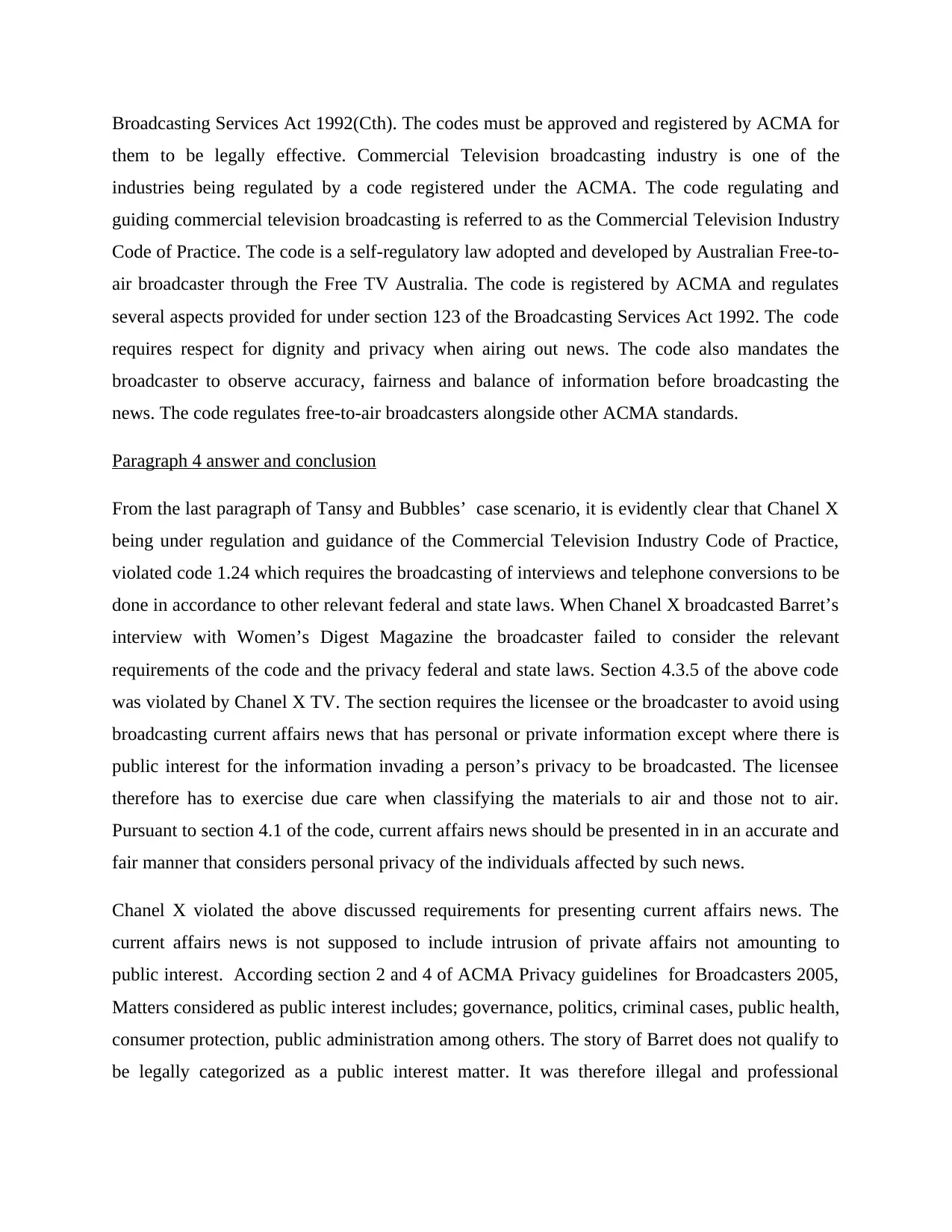
Broadcasting Services Act 1992(Cth). The codes must be approved and registered by ACMA for
them to be legally effective. Commercial Television broadcasting industry is one of the
industries being regulated by a code registered under the ACMA. The code regulating and
guiding commercial television broadcasting is referred to as the Commercial Television Industry
Code of Practice. The code is a self-regulatory law adopted and developed by Australian Free-to-
air broadcaster through the Free TV Australia. The code is registered by ACMA and regulates
several aspects provided for under section 123 of the Broadcasting Services Act 1992. The code
requires respect for dignity and privacy when airing out news. The code also mandates the
broadcaster to observe accuracy, fairness and balance of information before broadcasting the
news. The code regulates free-to-air broadcasters alongside other ACMA standards.
Paragraph 4 answer and conclusion
From the last paragraph of Tansy and Bubbles’ case scenario, it is evidently clear that Chanel X
being under regulation and guidance of the Commercial Television Industry Code of Practice,
violated code 1.24 which requires the broadcasting of interviews and telephone conversions to be
done in accordance to other relevant federal and state laws. When Chanel X broadcasted Barret’s
interview with Women’s Digest Magazine the broadcaster failed to consider the relevant
requirements of the code and the privacy federal and state laws. Section 4.3.5 of the above code
was violated by Chanel X TV. The section requires the licensee or the broadcaster to avoid using
broadcasting current affairs news that has personal or private information except where there is
public interest for the information invading a person’s privacy to be broadcasted. The licensee
therefore has to exercise due care when classifying the materials to air and those not to air.
Pursuant to section 4.1 of the code, current affairs news should be presented in in an accurate and
fair manner that considers personal privacy of the individuals affected by such news.
Chanel X violated the above discussed requirements for presenting current affairs news. The
current affairs news is not supposed to include intrusion of private affairs not amounting to
public interest. According section 2 and 4 of ACMA Privacy guidelines for Broadcasters 2005,
Matters considered as public interest includes; governance, politics, criminal cases, public health,
consumer protection, public administration among others. The story of Barret does not qualify to
be legally categorized as a public interest matter. It was therefore illegal and professional
them to be legally effective. Commercial Television broadcasting industry is one of the
industries being regulated by a code registered under the ACMA. The code regulating and
guiding commercial television broadcasting is referred to as the Commercial Television Industry
Code of Practice. The code is a self-regulatory law adopted and developed by Australian Free-to-
air broadcaster through the Free TV Australia. The code is registered by ACMA and regulates
several aspects provided for under section 123 of the Broadcasting Services Act 1992. The code
requires respect for dignity and privacy when airing out news. The code also mandates the
broadcaster to observe accuracy, fairness and balance of information before broadcasting the
news. The code regulates free-to-air broadcasters alongside other ACMA standards.
Paragraph 4 answer and conclusion
From the last paragraph of Tansy and Bubbles’ case scenario, it is evidently clear that Chanel X
being under regulation and guidance of the Commercial Television Industry Code of Practice,
violated code 1.24 which requires the broadcasting of interviews and telephone conversions to be
done in accordance to other relevant federal and state laws. When Chanel X broadcasted Barret’s
interview with Women’s Digest Magazine the broadcaster failed to consider the relevant
requirements of the code and the privacy federal and state laws. Section 4.3.5 of the above code
was violated by Chanel X TV. The section requires the licensee or the broadcaster to avoid using
broadcasting current affairs news that has personal or private information except where there is
public interest for the information invading a person’s privacy to be broadcasted. The licensee
therefore has to exercise due care when classifying the materials to air and those not to air.
Pursuant to section 4.1 of the code, current affairs news should be presented in in an accurate and
fair manner that considers personal privacy of the individuals affected by such news.
Chanel X violated the above discussed requirements for presenting current affairs news. The
current affairs news is not supposed to include intrusion of private affairs not amounting to
public interest. According section 2 and 4 of ACMA Privacy guidelines for Broadcasters 2005,
Matters considered as public interest includes; governance, politics, criminal cases, public health,
consumer protection, public administration among others. The story of Barret does not qualify to
be legally categorized as a public interest matter. It was therefore illegal and professional
⊘ This is a preview!⊘
Do you want full access?
Subscribe today to unlock all pages.

Trusted by 1+ million students worldwide
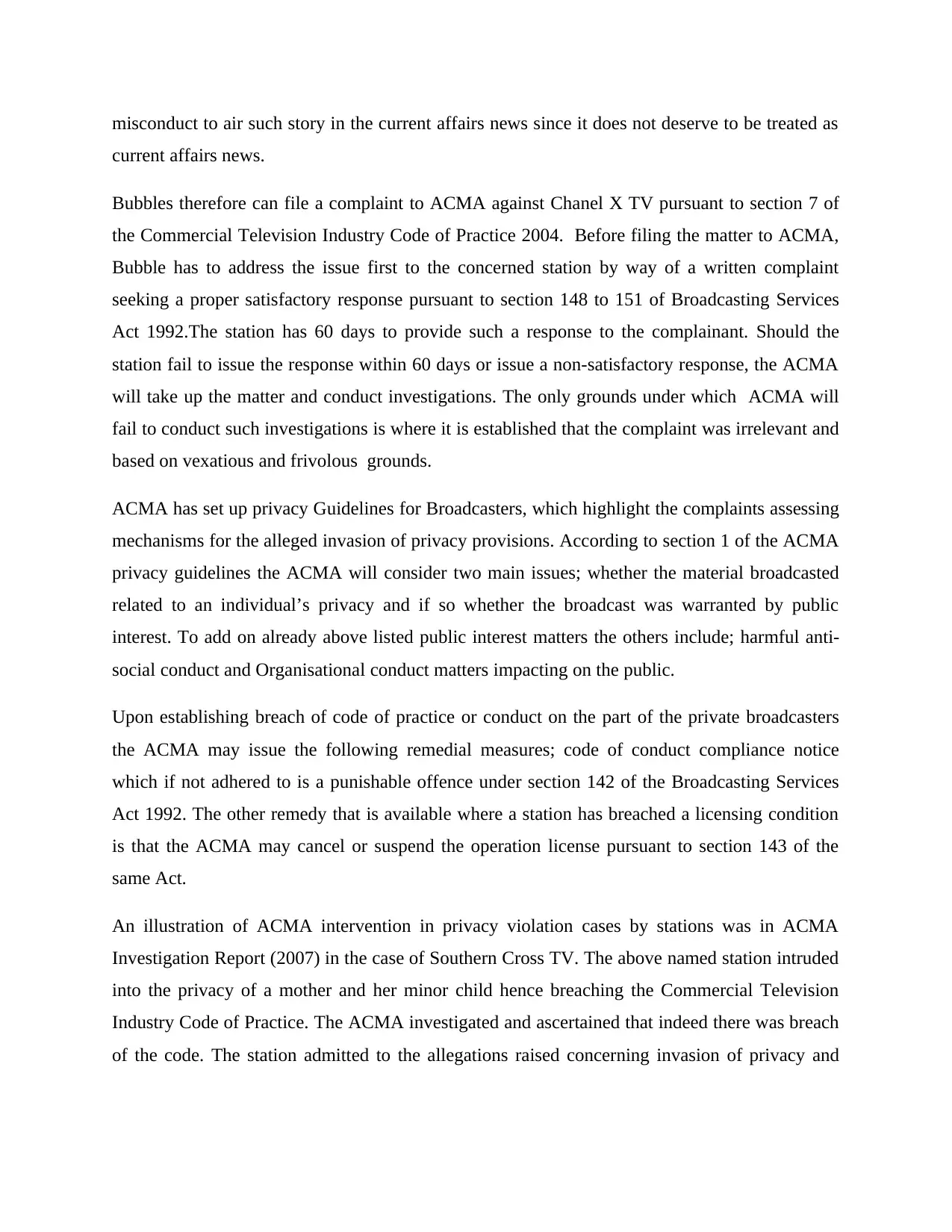
misconduct to air such story in the current affairs news since it does not deserve to be treated as
current affairs news.
Bubbles therefore can file a complaint to ACMA against Chanel X TV pursuant to section 7 of
the Commercial Television Industry Code of Practice 2004. Before filing the matter to ACMA,
Bubble has to address the issue first to the concerned station by way of a written complaint
seeking a proper satisfactory response pursuant to section 148 to 151 of Broadcasting Services
Act 1992.The station has 60 days to provide such a response to the complainant. Should the
station fail to issue the response within 60 days or issue a non-satisfactory response, the ACMA
will take up the matter and conduct investigations. The only grounds under which ACMA will
fail to conduct such investigations is where it is established that the complaint was irrelevant and
based on vexatious and frivolous grounds.
ACMA has set up privacy Guidelines for Broadcasters, which highlight the complaints assessing
mechanisms for the alleged invasion of privacy provisions. According to section 1 of the ACMA
privacy guidelines the ACMA will consider two main issues; whether the material broadcasted
related to an individual’s privacy and if so whether the broadcast was warranted by public
interest. To add on already above listed public interest matters the others include; harmful anti-
social conduct and Organisational conduct matters impacting on the public.
Upon establishing breach of code of practice or conduct on the part of the private broadcasters
the ACMA may issue the following remedial measures; code of conduct compliance notice
which if not adhered to is a punishable offence under section 142 of the Broadcasting Services
Act 1992. The other remedy that is available where a station has breached a licensing condition
is that the ACMA may cancel or suspend the operation license pursuant to section 143 of the
same Act.
An illustration of ACMA intervention in privacy violation cases by stations was in ACMA
Investigation Report (2007) in the case of Southern Cross TV. The above named station intruded
into the privacy of a mother and her minor child hence breaching the Commercial Television
Industry Code of Practice. The ACMA investigated and ascertained that indeed there was breach
of the code. The station admitted to the allegations raised concerning invasion of privacy and
current affairs news.
Bubbles therefore can file a complaint to ACMA against Chanel X TV pursuant to section 7 of
the Commercial Television Industry Code of Practice 2004. Before filing the matter to ACMA,
Bubble has to address the issue first to the concerned station by way of a written complaint
seeking a proper satisfactory response pursuant to section 148 to 151 of Broadcasting Services
Act 1992.The station has 60 days to provide such a response to the complainant. Should the
station fail to issue the response within 60 days or issue a non-satisfactory response, the ACMA
will take up the matter and conduct investigations. The only grounds under which ACMA will
fail to conduct such investigations is where it is established that the complaint was irrelevant and
based on vexatious and frivolous grounds.
ACMA has set up privacy Guidelines for Broadcasters, which highlight the complaints assessing
mechanisms for the alleged invasion of privacy provisions. According to section 1 of the ACMA
privacy guidelines the ACMA will consider two main issues; whether the material broadcasted
related to an individual’s privacy and if so whether the broadcast was warranted by public
interest. To add on already above listed public interest matters the others include; harmful anti-
social conduct and Organisational conduct matters impacting on the public.
Upon establishing breach of code of practice or conduct on the part of the private broadcasters
the ACMA may issue the following remedial measures; code of conduct compliance notice
which if not adhered to is a punishable offence under section 142 of the Broadcasting Services
Act 1992. The other remedy that is available where a station has breached a licensing condition
is that the ACMA may cancel or suspend the operation license pursuant to section 143 of the
same Act.
An illustration of ACMA intervention in privacy violation cases by stations was in ACMA
Investigation Report (2007) in the case of Southern Cross TV. The above named station intruded
into the privacy of a mother and her minor child hence breaching the Commercial Television
Industry Code of Practice. The ACMA investigated and ascertained that indeed there was breach
of the code. The station admitted to the allegations raised concerning invasion of privacy and
Paraphrase This Document
Need a fresh take? Get an instant paraphrase of this document with our AI Paraphraser
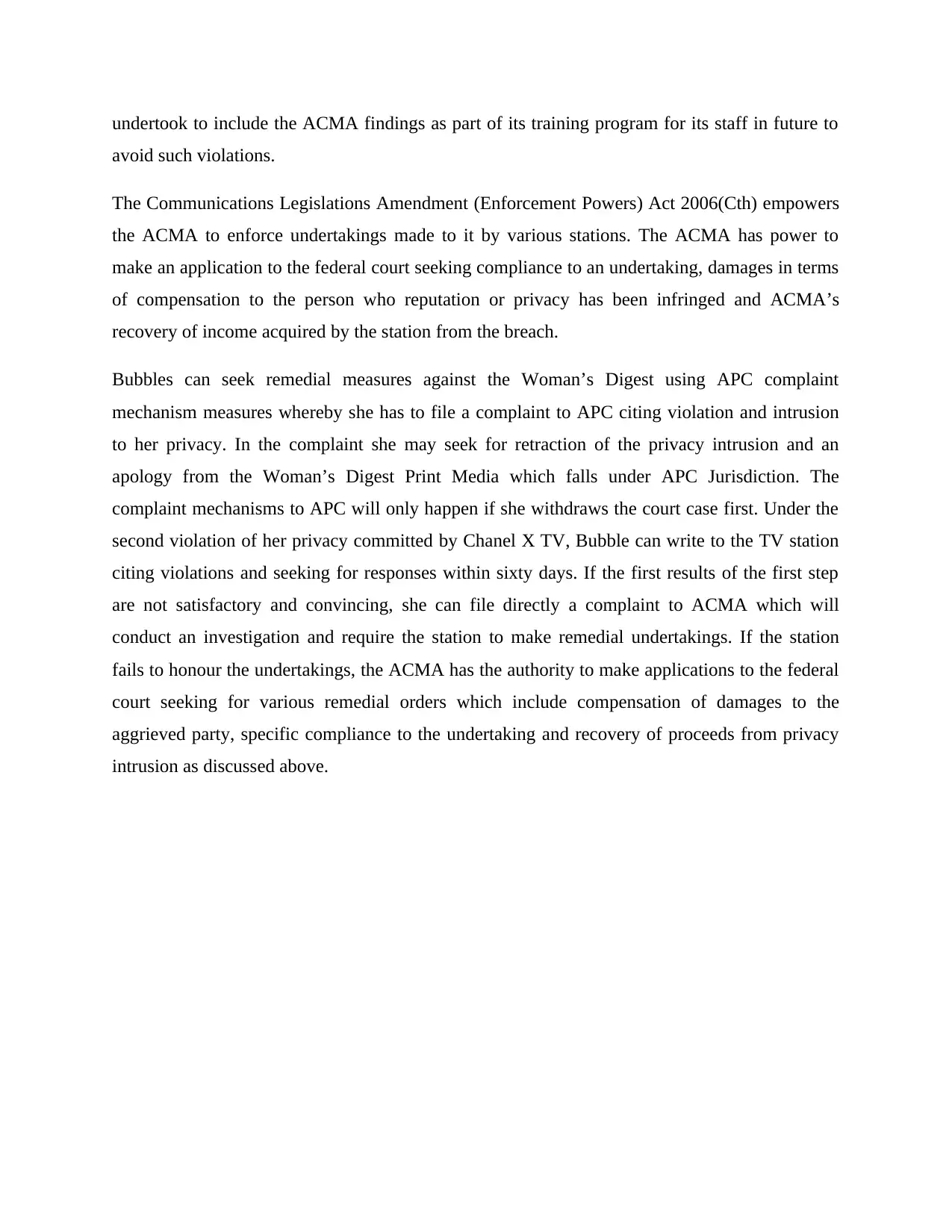
undertook to include the ACMA findings as part of its training program for its staff in future to
avoid such violations.
The Communications Legislations Amendment (Enforcement Powers) Act 2006(Cth) empowers
the ACMA to enforce undertakings made to it by various stations. The ACMA has power to
make an application to the federal court seeking compliance to an undertaking, damages in terms
of compensation to the person who reputation or privacy has been infringed and ACMA’s
recovery of income acquired by the station from the breach.
Bubbles can seek remedial measures against the Woman’s Digest using APC complaint
mechanism measures whereby she has to file a complaint to APC citing violation and intrusion
to her privacy. In the complaint she may seek for retraction of the privacy intrusion and an
apology from the Woman’s Digest Print Media which falls under APC Jurisdiction. The
complaint mechanisms to APC will only happen if she withdraws the court case first. Under the
second violation of her privacy committed by Chanel X TV, Bubble can write to the TV station
citing violations and seeking for responses within sixty days. If the first results of the first step
are not satisfactory and convincing, she can file directly a complaint to ACMA which will
conduct an investigation and require the station to make remedial undertakings. If the station
fails to honour the undertakings, the ACMA has the authority to make applications to the federal
court seeking for various remedial orders which include compensation of damages to the
aggrieved party, specific compliance to the undertaking and recovery of proceeds from privacy
intrusion as discussed above.
avoid such violations.
The Communications Legislations Amendment (Enforcement Powers) Act 2006(Cth) empowers
the ACMA to enforce undertakings made to it by various stations. The ACMA has power to
make an application to the federal court seeking compliance to an undertaking, damages in terms
of compensation to the person who reputation or privacy has been infringed and ACMA’s
recovery of income acquired by the station from the breach.
Bubbles can seek remedial measures against the Woman’s Digest using APC complaint
mechanism measures whereby she has to file a complaint to APC citing violation and intrusion
to her privacy. In the complaint she may seek for retraction of the privacy intrusion and an
apology from the Woman’s Digest Print Media which falls under APC Jurisdiction. The
complaint mechanisms to APC will only happen if she withdraws the court case first. Under the
second violation of her privacy committed by Chanel X TV, Bubble can write to the TV station
citing violations and seeking for responses within sixty days. If the first results of the first step
are not satisfactory and convincing, she can file directly a complaint to ACMA which will
conduct an investigation and require the station to make remedial undertakings. If the station
fails to honour the undertakings, the ACMA has the authority to make applications to the federal
court seeking for various remedial orders which include compensation of damages to the
aggrieved party, specific compliance to the undertaking and recovery of proceeds from privacy
intrusion as discussed above.
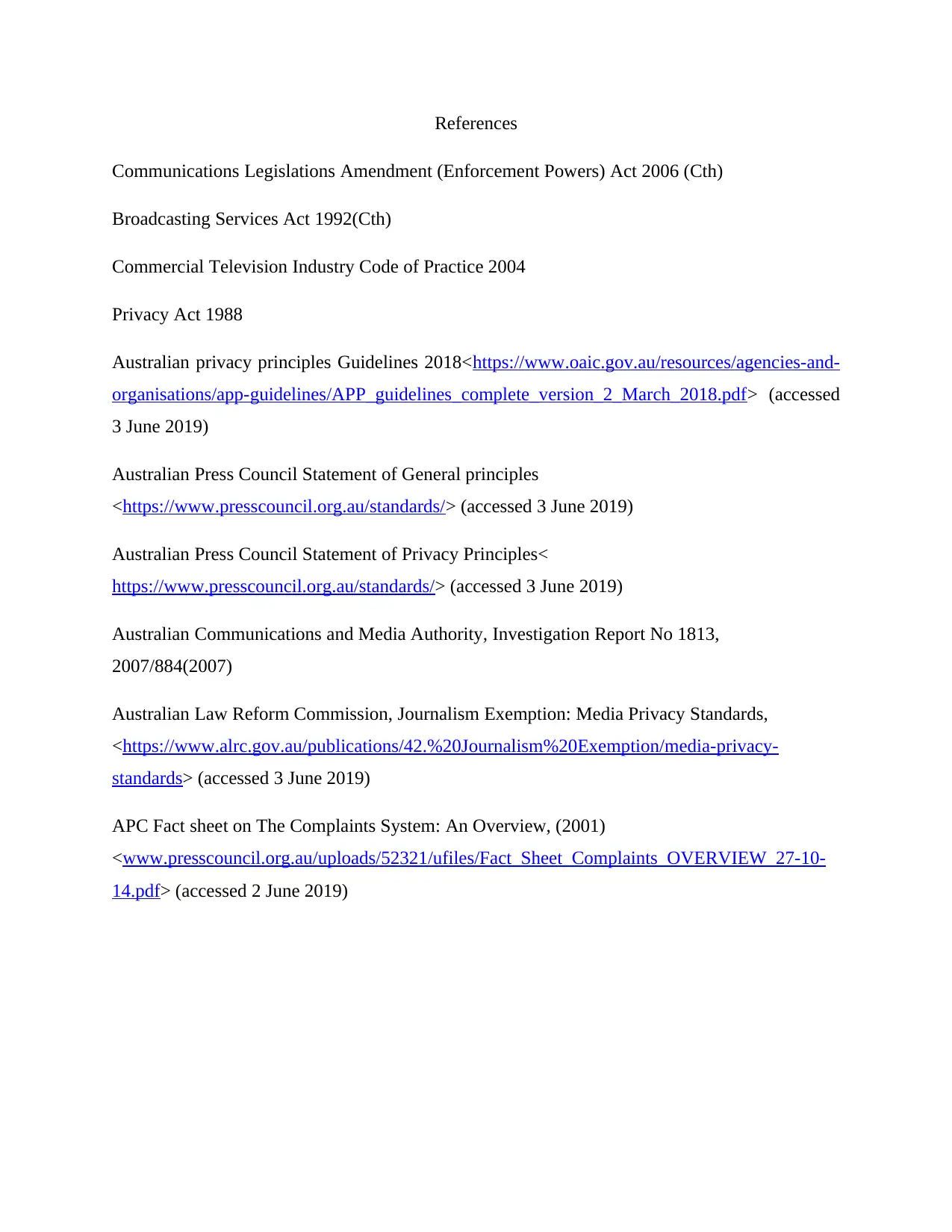
References
Communications Legislations Amendment (Enforcement Powers) Act 2006 (Cth)
Broadcasting Services Act 1992(Cth)
Commercial Television Industry Code of Practice 2004
Privacy Act 1988
Australian privacy principles Guidelines 2018<https://www.oaic.gov.au/resources/agencies-and-
organisations/app-guidelines/APP_guidelines_complete_version_2_March_2018.pdf> (accessed
3 June 2019)
Australian Press Council Statement of General principles
<https://www.presscouncil.org.au/standards/> (accessed 3 June 2019)
Australian Press Council Statement of Privacy Principles<
https://www.presscouncil.org.au/standards/> (accessed 3 June 2019)
Australian Communications and Media Authority, Investigation Report No 1813,
2007/884(2007)
Australian Law Reform Commission, Journalism Exemption: Media Privacy Standards,
<https://www.alrc.gov.au/publications/42.%20Journalism%20Exemption/media-privacy-
standards> (accessed 3 June 2019)
APC Fact sheet on The Complaints System: An Overview, (2001)
<www.presscouncil.org.au/uploads/52321/ufiles/Fact_Sheet_Complaints_OVERVIEW_27-10-
14.pdf> (accessed 2 June 2019)
Communications Legislations Amendment (Enforcement Powers) Act 2006 (Cth)
Broadcasting Services Act 1992(Cth)
Commercial Television Industry Code of Practice 2004
Privacy Act 1988
Australian privacy principles Guidelines 2018<https://www.oaic.gov.au/resources/agencies-and-
organisations/app-guidelines/APP_guidelines_complete_version_2_March_2018.pdf> (accessed
3 June 2019)
Australian Press Council Statement of General principles
<https://www.presscouncil.org.au/standards/> (accessed 3 June 2019)
Australian Press Council Statement of Privacy Principles<
https://www.presscouncil.org.au/standards/> (accessed 3 June 2019)
Australian Communications and Media Authority, Investigation Report No 1813,
2007/884(2007)
Australian Law Reform Commission, Journalism Exemption: Media Privacy Standards,
<https://www.alrc.gov.au/publications/42.%20Journalism%20Exemption/media-privacy-
standards> (accessed 3 June 2019)
APC Fact sheet on The Complaints System: An Overview, (2001)
<www.presscouncil.org.au/uploads/52321/ufiles/Fact_Sheet_Complaints_OVERVIEW_27-10-
14.pdf> (accessed 2 June 2019)
⊘ This is a preview!⊘
Do you want full access?
Subscribe today to unlock all pages.

Trusted by 1+ million students worldwide
1 out of 6
Your All-in-One AI-Powered Toolkit for Academic Success.
+13062052269
info@desklib.com
Available 24*7 on WhatsApp / Email
![[object Object]](/_next/static/media/star-bottom.7253800d.svg)
Unlock your academic potential
Copyright © 2020–2026 A2Z Services. All Rights Reserved. Developed and managed by ZUCOL.